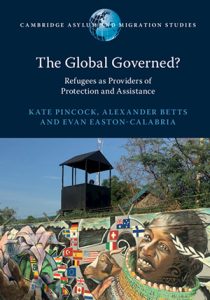The Global Governed?: Refugees as Providers of Protection and Assistance

Author: Kate Pincock, Alexander Betts, and Evan Easton-Calabria
Publisher: Cambridge University Press
Year of Publication: 2020
Print Length: 154 pages
Genre: Non-Fiction / Anthropology, International Relations
Area: Uganda, Kampala, Nakivale Refugee Camp, Kenya, Nairobi, Kakuma Refugee Camp
Topic: Global System, Refugee Management/Governance, Refugees’ Roles & Self-Reliance, Refugee-Led Organisations & Networks, Asylum & Asylum Seekers, Refugees & Forced Migration, Asylum & Refugee System, Protection, Camps, Refugee Urban Settlement, City & Urban, Responses to Refugees; Self-Determination, Autonomy, Agency; Collaboration & Participation, Peace, Humanitarian Action & Humanitarianism, Development, Non-Profit Organization (NGO), International Institutions, Policy & Practice, Politics & Power, Medicine & Healthcare, Care, Children & Childhood
When refugees flee war and persecution, protection and assistance are usually provided by United Nations organisations and their NGO implementing partners. In camps and cities, the dominant humanitarian model remains premised upon a provider-beneficiary relationship. In parallel to this model, however, is a largely neglected story: refugees themselves frequently mobilise to create organisations or networks as alternative providers of social protection.
Based on fieldwork in refugee camps and cities in Uganda and Kenya, this book examines how refugee-led organisations emerge, the forms they take, and their interactions with international institutions. Developing an original theoretical framework based on the concept of ‘the global governed’, the book shows how power and hierarchy mediate the seemingly benign notion of protection. Drawing upon ideas from anthropology and international relations, it offers an alternative vision for more participatory global governance, of relevance to other policy-fields including development, humanitarianism, health, peacekeeping, and child protection.
Table of Contents
List of Figures
List of Tables
Series Editor’s Preface
Acknowledgements
1. Introduction
2. Theoretical Framework
3. Kampala
4. Nakivale
5. Nairobi
6. Kakuma
Conclusion
Appendix
References
Index

Kate Pincock is a Researcher at the Overseas Development Institute, Rethinking Refuge Project, Refugee Studies Centre, University of Oxford. Sghe completed a PhD in International Development at the University of Bath in 2016. Her doctoral research in Tanzania highlighted tensions within discursive framings of teenage girlhood and sexuality in development policy and explored their implications for praxis. From 2017 to 2019, Kate worked as a Research Officer for the Refugee Studies Centre at the University of Oxford on the ESRC-funded ‘The Global Governed? Refugee-led Protection and Assistance’ project, undertaking ethnographic research on community-based social protection in Uganda and Kenya. Her research interests include theories of agency and empowerment, young people’s sexual and reproductive rights, and the construction of ‘girlhood’ through development narratives. She is particularly interested in exploring how humanitarian organisations engage with the SDG’s ‘Leave No One Behind’ agenda, and the implications of a renewed focus on youth and gender for work with forcibly displaced adolescent girls in East Africa. She is currently working as a researcher for the Overseas Development Institute on the Gender and Adolescence: Global Evidence programme.
Source: https://www.rethinkingrefuge.org/authors/kate-pincock
More from Kate Pincock in this library, click here.

Alexander Betts is Professor of Forced Migration and International Affairs, William Golding Senior Fellow in Politics at Brasenose College, University of Oxford. His research focuses on the political economy of refugee protection. He is particularly interested in refugees’ access to socio-economic rights and opportunities, and he has undertaken research across Africa and Europe, and also works on broader themes relating to the politics of migration and humanitarianism. He is author of 12 books and around 100 scholarly publications. His most recent book is The Wealth of Refugees: How Displaced People Can Build Economies (Oxford University Press, 2021), which was awarded the International Studies Association’s ‘Ethnicity, Nationalism, and Migration’ section Distinguished Book Award for 2022. His other books include Refuge: Transforming a Broken Refugee System (Penguin Allen Lane, 2017 with Paul Collier), which was named by the Economist among the ‘best books of 2017’ and The Global Governed? Refugees as Providers of Social Protection (Cambridge University Press, 2020, with Kate Pincock and Evan Easton-Calabria). He leads the IKEA Foundation-funded Refugee Economies Programme, which undertakes participatory research on the economic lives of refugees in Uganda, Kenya, and Ethiopia, and has created one of the first multi-country data sets focusing on the economic lives of refugees and host communities.
Source: https://www.rsc.ox.ac.uk/people/alexander-betts
More from Alexander Betts in this library, click here.

Evan Easton-Calabria is a research associate at the Refugee Studies Centre and a senior researcher at the Feinstein International Center, Tufts University. Previously she was Principal Investigator of the RSC research project, ‘Responses to Crisis Migration in Uganda and Ethiopia: Researching the role of local actors in secondary cities’, funded through the Cities Alliance/UNOPS, and a John Fell Fund grant, ‘Digital Livelihoods for Refugees? Exploring pathways to the new world of work in Nairobi and Tel Aviv’. She is also lead editor of the Refugee Studies Centre’s research dissemination platform Rethinking Refuge. Prior to this she worked on the Refugee Economies Programme’s research project on refugee-led social protection. Her work with refugees began in Kampala, Uganda, in 2011 and has led her to research historical and contemporary refugee self-reliance assistance and refugees’ involvement with development since the 1920s. In 2015 she was Principle Investigator for the National Geographic Early Career Grant project ‘Innovation and the Art of Self-Reliance: Artistic Livelihoods of Kampalan Refugees’ and in 2015-2016 for the research project ‘Researching Refugee-Run Micro-Finance’ funded by the Humanitarian Innovation Fund. While living in Uganda, she co-founded a grassroots organisation with refugees in Kampala that provides livelihoods training and support to urban refugees. She holds a Masters and Doctorate in International Development from the University of Oxford.
Source: https://www.rsc.ox.ac.uk/people/evan-easton-calabria
More from Evan Easton-Calabria in this library, click here.
